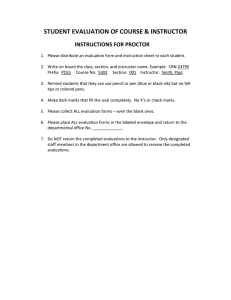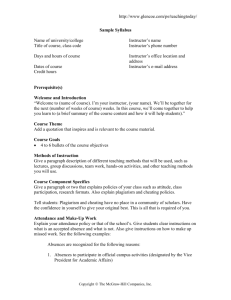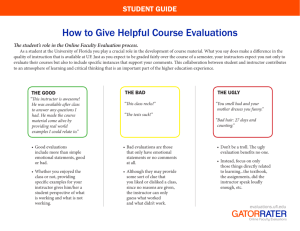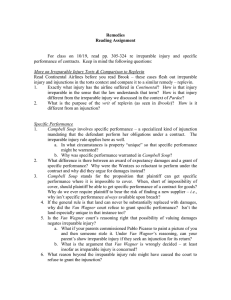Policies
advertisement
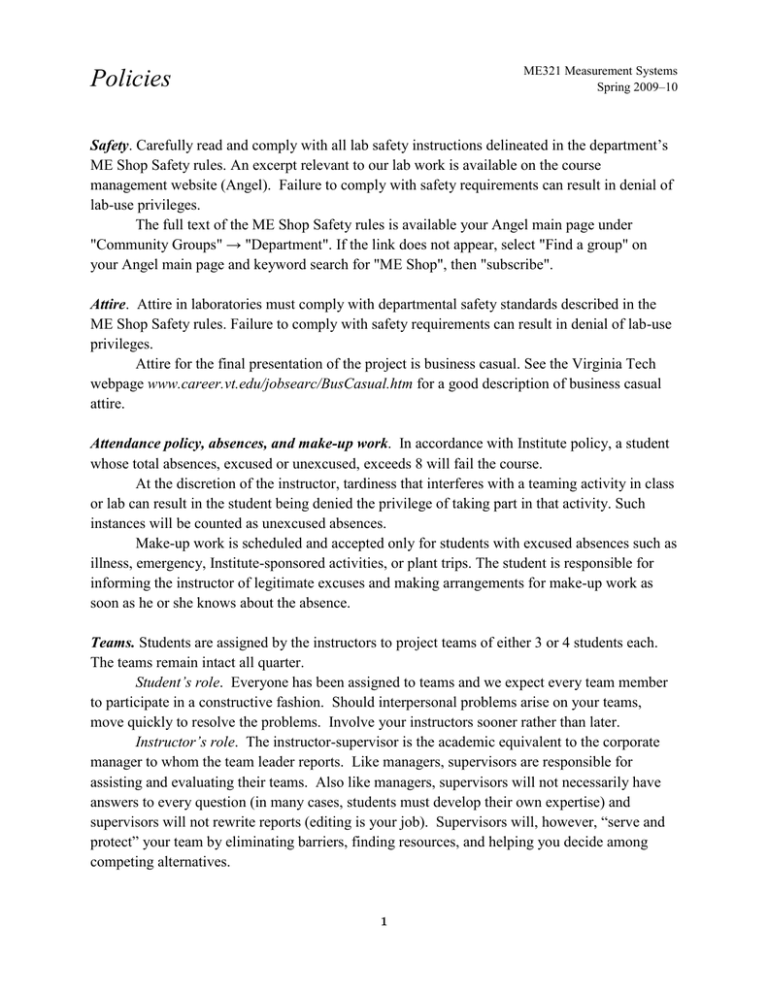
ME321 Measurement Systems Spring 2009–10 Policies Safety. Carefully read and comply with all lab safety instructions delineated in the department’s ME Shop Safety rules. An excerpt relevant to our lab work is available on the course management website (Angel). Failure to comply with safety requirements can result in denial of lab-use privileges. The full text of the ME Shop Safety rules is available your Angel main page under "Community Groups" → "Department". If the link does not appear, select "Find a group" on your Angel main page and keyword search for "ME Shop", then "subscribe". Attire. Attire in laboratories must comply with departmental safety standards described in the ME Shop Safety rules. Failure to comply with safety requirements can result in denial of lab-use privileges. Attire for the final presentation of the project is business casual. See the Virginia Tech webpage www.career.vt.edu/jobsearc/BusCasual.htm for a good description of business casual attire. Attendance policy, absences, and make-up work. In accordance with Institute policy, a student whose total absences, excused or unexcused, exceeds 8 will fail the course. At the discretion of the instructor, tardiness that interferes with a teaming activity in class or lab can result in the student being denied the privilege of taking part in that activity. Such instances will be counted as unexcused absences. Make-up work is scheduled and accepted only for students with excused absences such as illness, emergency, Institute-sponsored activities, or plant trips. The student is responsible for informing the instructor of legitimate excuses and making arrangements for make-up work as soon as he or she knows about the absence. Teams. Students are assigned by the instructors to project teams of either 3 or 4 students each. The teams remain intact all quarter. Student’s role. Everyone has been assigned to teams and we expect every team member to participate in a constructive fashion. Should interpersonal problems arise on your teams, move quickly to resolve the problems. Involve your instructors sooner rather than later. Instructor’s role. The instructor-supervisor is the academic equivalent to the corporate manager to whom the team leader reports. Like managers, supervisors are responsible for assisting and evaluating their teams. Also like managers, supervisors will not necessarily have answers to every question (in many cases, students must develop their own expertise) and supervisors will not rewrite reports (editing is your job). Supervisors will, however, “serve and protect” your team by eliminating barriers, finding resources, and helping you decide among competing alternatives. 1 Technicians’ support. The ME department technicians, Mr. Ray Bland, Mr. Ron Hofmann, and Mr. Mike Fulk, are available to advise you in the design, fabrication, and testing of your project. Peer evaluations. Peer evaluations, completed periodically during the quarter, are used to help teams reach a higher level of performance and to assign individual grades based on group project grades. Your evaluations are not anonymous (your instructors know who you are) but they are confidential (not shared with anyone else). Please give your teammates the privacy they need to complete the peer evaluations confidentially. Project space. In general, most of the ME lab spaces are available for your work, though we have to share all our lab spaces with project teams in other ME courses. Please be considerate of other students and faculty and use the Rose-Hulman facilities cooperatively. Required textbook and laptop use. Please bring your textbook and laptop with you to all class periods. Preparation for experiential learning. Being prepared for class is particularly important in this course because of our emphasis on cooperative, hands-on learning. Thoughtful work on the prelab before coming to class can make your experience in the workshop or mini-lab more productive than it would be otherwise. Labeling graded work. Please include your team number, name of partner(s), and a campus mailbox to which graded work can be returned. Assumed background Ability to apply basic principles of physics, chemistry, statics, engineering science (mechanical systems, electrical systems, fluid/thermal systems), and mechanics of materials to problems associated with engineering experimentation. Interest in learning to communicate technical information in a manner consistent with professional practice. Ability to perform basic calculations in probability and statistics. Operation of measurement devices. Know the principle of operation of a measurement device before you use it. Can you define the input? Can you define the output? Can you describe how the device produces its output? To assist your learning, carefully read, with the goal of understanding, your two primary sources of information regarding the operating principles of measurement devices: Course textbook Manufacturer’s documentation 2 Readout instruments Oscilloscopes: Please ask for help with scopes before making random adjustments. It saves everyone time if you ask for help sooner rather than later. Multimeters: Please carefully check connections and settings to avoid overloads. Be certain you have connected each conductor exactly where it is supposed to be. Connections to measurement devices. After reading the text and manufacturer’s documentation, make sure you fully understand all connections to the measurement device BEFORE you apply power. Understanding the principle of operation helps a lot. Ask your instructor and technician for help if there is anything you do not understand about connecting the measurement device. You can cause irreparable damage if you “guess and check”. You can cause irreparable damage if you don’t read the documentation. You can cause irreparable damage if you don’t treat components with care. Interacting with the technicians. Some helpful hints to smooth your interactions with the technical staff, both at Rose and in industry. Always treat technical staff with professional respect and courtesy. They have a lot of experience to offer and are an integral part of every successful project. Before asking for a particular type of transducer, know what range of measurement you are trying to measure. For example, instead of asking what load cells we have in stock, figure out what the likely range of forces are you are trying to measure, then ask for a load cell appropriate to that range. Know your measurand first! Projects, projects, everywhere! Our course is not the only class requiring students to work with our technicians on projects, thus: No guarantee that a technician is available at exactly the time you want his attention Think ahead! Request an appointment (email) with a technician whenever possible. See your instructor for help. Equipment use. At the end of the quarter, one member of the team is required to see Ray Bland to verify that no one on your team still has equipment checked out and that your project work areas are cleaned and orderly. Ray records that this step is complete. Teams do not receive a grade if this step is incomplete. 3
